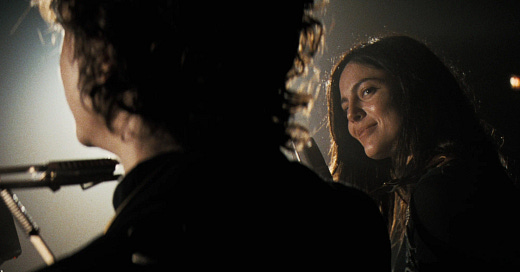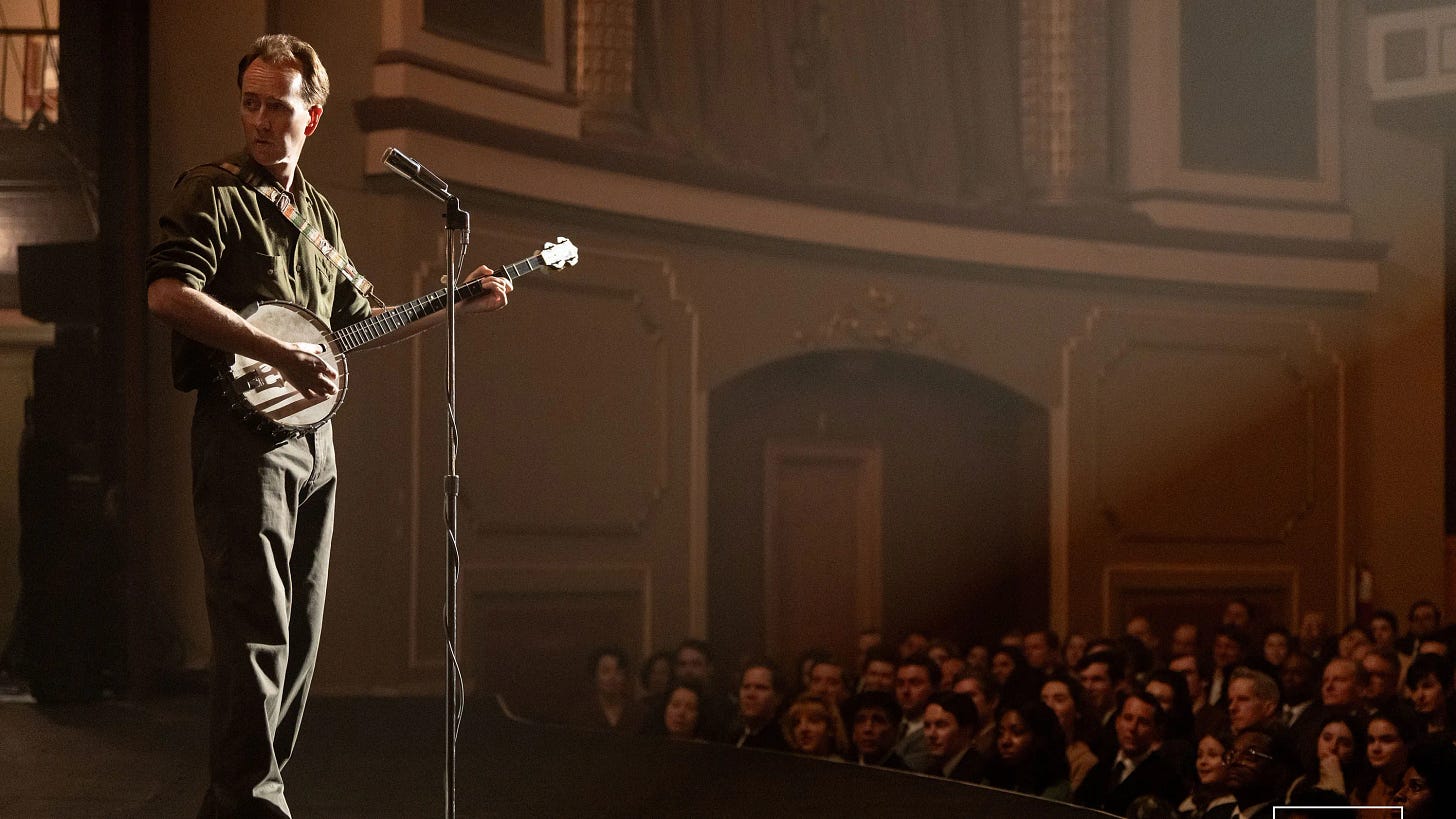'You've got a lotta nerve'
James Mangold came so close, but couldn't resist the temptation to turn 'A Complete Unknown' into a typically formulaic music biopic
I went into a screening of "A Complete Unknown" on Sunday with no plans to write about it. Bob knows there are enough takes out there — hot and otherwise — about James Mangold's Dylan biopic. And I was fine up until the last 10 minutes of the film when things really went off the rails for me.
I’ll start with what seems a bit odd for a film inspired by true events: A spoiler alert. Given the way those events are compressed, augmented, and juggled, it seems necessary. If you haven't seen the film and want to be surprised, stop here.
I know filmmakers feel the need to mess with timelines, and I was fully expecting that here. Composite characters stand in for multiple people, things that happened months apart are suddenly sequential, and events that were meaningful only in hindsight are given contemporaneous import. I expected all of that here and found it. It wasn't necessary. If anyone's origin story is strong enough to be conveyed without augmentation, it is Dylan's. But with four years' worth of life to squeeze into two hours, I'll forgive filmmaker James Mangold for most of the liberties taken.
For much of the film, this works more than it doesn't. No, Dylan didn't show up in New York one day, wander into a bar to be told by someone1 how to find the hospital where Woody Guthrie was a patient, cab out there to find Pete Seeger sitting at Guthrie's bedside, play them both "Song to Woody," get a ride home with Seeger, crash at his house, and play the family a nascent version of “Girl from the North Country.” I mean, wouldn't it have been cooler if he did? Sure, but these separate incidents on separate days, along with some healthy poetic license, are fine to condense.
And for the most part, this all feels right. Having walked some of these same New York streets this spring, I'm amazed at how well Mangold and his crew transformed Greenwich Village into its early '60s self. I wasn't there at the time, of course, but I've seen enough photos and film for reference. This feels gritty and lived in. Did Joan Baez walk down the stairs of a folk club the night President Kennedy went on TV to explain the Cuban missile crisis and see Dylan performing the freshly written "Masters of War"? No. But the scene does capture the tension of the moment and the way Dylan, more than any other folksinger of the time, seemed able to address timely topics in a way that made those songs still relevant today while other responses were stale by the end of the month. And it does so in locations that don't feel like movie sets.
As such, I was willing to let Mangold tell the story, knowing this broad strokes approach wasn't meant for people like me with enough books, CDs, DVDs, albums, photos and other ephemera by or about Dylan in his home to trick out a modest shrine.
The biggest stumbling block that kept me from full immersion was that I could never buy Timothée Chalamet as Dylan, his performance never transcending that of a guy pretending to be the guy who pretended to be Bob Dylan. Perhaps Chalamet had an impossible task, but to my eye, he was outshined by everyone else in the film. Edward Norton was fantastic as Pete Seeger — a sequel focusing on that folk pioneer's fascinating life would be worth watching — as he truly inhabited the role. Monica Barbaro humanized Joan Baez in a way that countered the hectoring presence she usually inhabits in Dylan lore, while Elle Fanning — cast as Dylan's first New York girlfriend Suze Rotolo but named Sylvie Russo here at Dylan’s request — also does well to show how important Rotolo was to the young Dylan as a guide to the folk scene. Both Barbaro and Fanning balance what must have been the excitement and grind of dealing with someone making himself up right before their eyes.
And, for the first time, I came away with a sense of what it must have been like to be Bob Dylan in the early '60s, to stand inside his shoes and know what a drag it is to be him. You see it in "Dont Look Back," which captures his 1965 tour of England that took place toward the end of the timeline of "A Complete Unknown." But by showing us Dylan in everyday situations — not when he is being trailed by a camera crew — the film offers a glimpse of those heady days when his genius flowered and everyone wanted a taste.
It is with the depiction of the 1965 Newport Folk Festival that everything fell apart for me. It is the denouement of the movie, the event that even the most casual Dylan fan knows about, when he “went electric.” Nearly 60 years on, such a notion could seem quaint. As the Kinks record playing in Dylan's hotel room before he goes on makes clear, it wasn't as if loud, electric rock music wasn't already a well-established thing by that point, so why the fuss? But as the film addresses with another poignant scene featuring Norton's Seeger, it wasn't so much about Dylan stepping into a well-established world, but rather about leaving one behind, one he had helped to build while those who helped him along the way felt betrayed.
You can go to YouTube, or watch any number of documentary films, to see what actually happened that night of Sunday, July 25, in Newport. Dylan and his band — mostly made up of members of the Paul Butterfield Blues Band, which has performed earlier at the festival — performed three songs. It drew as many cheers as boos, and some of the boos were because of the loud, distorted sound, some because of what was seen as Dylan turning his back on a movement. He returned with an acoustic guitar to perform two songs, the second of which was "It's All Over Now, Baby Blue."
Opening the electric set with "Maggie's Farm" (as in, "I ain't gonna work on…") and closing his performance with a song where the first verse is "You must leave, now take what you need/You think will last/ But whatever you wish to keep/ You better grab it fast" always seemed like a self-explanatory kiss-off, an obvious declaration of his intent to move on. There is no more clearly defined before-and-after moment in popular culture.
But Mangold isn’t content with this. During the subsequent 1966 tour of England, in an incident perhaps even more famous than the Newport festival, someone yells out "Judas!" during Dylan's electric set at a concert in Manchester. Dylan seethes in reply, "I don't believe you… you’re a liar!" then turns to the Band and says, "Play fucking loud," before they launch into a scorching version of "Like a Rolling Stone." These are two distinct events, separated by nearly a year, but Mangold seems intent on making sure the audience knows how divisive Dylan’s move toward electric music was and hits the audience over the head with an anachronistic scene, adding this to the Newport show. No one around me in the theater seemed to mind, but what little disbelief was suspended for me came rushing in at that moment. Fictionalizing things that are open to debate, or that don't really matter in the overall narrative arc is one thing. But conflating two things that are among the most well-documented events in the career of one of the most written-about people of the 20th century seems unforgivable.
As the final credits rolled after another five minutes of unnecessary narrative mopping up, "Like a Rolling Stone" played once again, and once again it was with Chalamet on vocals. The actor did a passable job of singing throughout the film, thankfully opting to sing as the character he had created rather than try to mimic Dylan's inimitable voice. But not playing the original felt like a missed opportunity, a chance to show how close the film's approximation had come, but also a chance to get back to the truth.
In "Maggie's Farm," Dylan sings, "Well, I try my best to be just like I am, but everybody wants you to be just like them." So much of this film conveys this feeling, the push-pull between what Dylan wanted to be and what others wanted him to be. In this way, it exceeded expectations. But by taking so many liberties with who he actually was and what he actually did, it is clear this doesn't really want to be a film about Bob Dylan. It wants to be like every other musical biopic — a messy life poured into a neat three-act container.
I had thought the character in the bar was meant to be Dave Van Ronk, but looking at the cast on IMDb, apparently someone else played Van Ronk in a way that escaped my notice. Either way, Van Ronk deserved more screen time, as he played as much a part in Dylan's development as anyone.






Thanks for the great review John, first-time reader here, I guess that's why Notes is maybe a good thing after all! I saw the movie just yesterday with my partner and my 20-year musical son. We all loved the film as a film but... as someone who has written extensively about this era himself, I....
...Well, we all have our breaking point with a biopic if we know anything about its subject matter. For me, that point came early in Bohemian Rhapsody, but was happily suspended for Rocket Man, which declared itself as what someone else in the comments section here refers to as a "MGM Musical" in its first few minutes. One Love was surprisingly and refreshingly true to history.
I am with you in that my breaking point came with Newport 65. You seem particularly aggrieved by the Judas heckle, but others below note the sheer overload: Johnny Cash (not there!), Suze/Sylvie (not there!), the fight between what Albert Grossman and what I assume to be George Wein, and for me, especially, it was the audience hurling objects at the stage. This was not a punk rock gig in in 1977. This was Newport 65, where folk fans behaved, and we may never truly truly know how much of the booing was merely down to the bad sound, but as you note, it was met by an equal amount of applause. Indeed, just this Dec 23rd I went to the same cinema I saw A Complete Unknown at yesterday, sat in the same seat more or less, and watched the Murray Lerner footage of Bob at Newport 63-65 (The Other Side of The Mirror) and was fascinated overall. The reaction to Maggie's Farm is so contradictory it's amazing.
But in short, I agree with your overview. Ed Norton stole the film and hopefully gets a nod in the awards for doing so. Other characters likewise. And as for Tim, well as you point out, trying to fill Bob's shoes is an impossible task. I think he performed it admirably in what was an entertaining, lovingly crafted, meticulously depicted but ultimately flawed movie.
Thank you so much for this take. I feel much the same way. I think Ed Norton is the MVP of this movie.